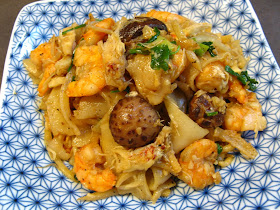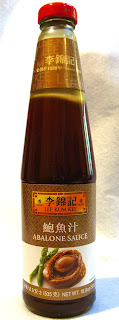This recipe was updated on 30 Aug 2016. The
Cantonese for Dungeness crab was added to the title.
This is a luxurious seafood chow fun dish using shrimp and cooked Dungeness crab meat with Gold Coin Shiitake mushrooms. Abalone sauce compliments this dish, but oyster sauce can be substituted if abalone sauce is not available. I happen to live in an area where freshly cooked Dungeness crab can be obtained seasonally (you just have to take the time to remove the meat from the shell), but you can substitute any cooked crab meat, fresh, frozen, or canned.
This is a luxurious seafood chow fun dish using shrimp and cooked Dungeness crab meat with Gold Coin Shiitake mushrooms. Abalone sauce compliments this dish, but oyster sauce can be substituted if abalone sauce is not available. I happen to live in an area where freshly cooked Dungeness crab can be obtained seasonally (you just have to take the time to remove the meat from the shell), but you can substitute any cooked crab meat, fresh, frozen, or canned.
Gold Coin Shiitake mushrooms are just small Shiitake
mushrooms that can be purchased at your local Asian market or Asian herb store.
Small mushrooms are used because they can be eaten whole in one bite, but you
can substitute regular sized mushrooms cut into strips if the small mushrooms
are not available. The small mushrooms are more expensive than the regular sized
Shiitake mushrooms, and they vary in price depending upon the quality of the
mushroom. You can get the best quality Shiitake mushrooms at an Asian herb
store (with the prices to match), but while Asian markets have lower quality
mushrooms in comparison, the mushrooms at Asian markets are still very tasty.
The main differences between the mushrooms at the herb store and the Asian
market are the appearance and “meatiness” of the mushrooms.
Shiitake mushrooms sold in Asian herb stores are whiter in
color than black, with a pattern (resembling a flower, as opposed to being a
solid black), are prized and priced accordingly. These mushrooms also are more “meaty”
than their counterparts, being thicker and having more texture when eaten than
the thinner mushrooms normally sold at Asian markets. Some of the best Shiitake
mushrooms sold at Asian herb shops come from Japan and are sold for higher
prices than the Asian market mushrooms. Asian markets sell higher grade
Shiitake mushrooms, but their best mushrooms do not match the quality found at
Asian herb shops. If you’re fortunate enough to have an Asian herb shop near
you, I would urge you to go in and explore their dried goods offerings (not
just mushrooms, but dried fish maw, shrimp, abalone, cloud ear fungus, and the
list goes on…).
Enjoy!
Ingredients
|
¾ lb.
|
375 g.
|
Cooked Dungeness crab meat (北美大肉蟹, bak1 mei5
daai6 juk6 haai5) or equivalent
|
|
|
|
|
|
¾ lb.
|
375 g.
|
Prawn or shrimp meat (蝦仁, haa1 jan4)
|
|
1 tsp.
|
5 ml.
|
Baking soda (蘇打粉, sou1 daa2 fan2)
|
|
½ in.
|
15 mm.
|
Knob of ginger
(薑, goeng1), crushed in a garlic
press
|
|
1 Tbs.
|
15 ml.
|
Tapioca starch
(木薯澱粉, muk6 syu4 din6
fan2)
|
|
1 Tbs.
|
15 ml.
|
Shaoxing rice
wine (紹興酒, siu6 hing1 zau2)
or dry sherry
|
|
½ tsp.
|
2.5 ml.
|
Ground white
pepper (白胡椒, baak6 wu4 ziu1)
|
|
1 tsp.
|
5 ml.
|
Sesame oil (麻油, maa4 jau4)
|
|
|
|
|
|
24
|
24
|
Whole Gold Coin
Shiitake mushrooms (金錢菇, gam1
cin4 gu1), rehydrated
|
|
10.5 oz.
|
297 g.
|
One 20 oz. (566
g.) can bamboo shoot strips (筍, seon2), drained, or use fresh if available
|
|
12 oz.
|
340 g.
|
Bean sprouts (芽菜, ngaa4 coi3)
|
|
3 stalks
|
3 stalks
|
Green onions (葱, cung1), cut into ½-inch (15 mm.) pieces on the diagonal
|
|
|
|
Cilantro leaves
and stems (芫茜, jyun4 sai1), cut
into ½-inch (15 mm.) pieces
|
|
½ in.
|
15 mm.
|
Knob of ginger
(薑, goeng1), crushed in a garlic
press
|
|
2 cloves
|
2 cloves
|
Garlic (蒜, syun3), crushed in a garlic press
|
|
|
|
|
|
1 lb.
|
454 g.
|
One package chow
fun noodles (炒粉, caau2 fan2)
|
|
|
|
Oil for cooking
|
Sauce Ingredients
|
2 Tbs.
|
30 ml.
|
Lee Kum Kee brand Abalone Sauce (鮑魚醬, baau1 jyu4 zoeng3) or
equivalent
|
|
2 Tbs.
|
30 ml.
|
Soy sauce (豉油, si6
jau4)
|
|
1 Tbs.
|
15 ml.
|
Hoisin sauce (海鮮醬, hoi2
sin1 zoeng3)
|
|
2 Tbs.
|
30 ml.
|
Shaoxing rice wine (紹興酒,
siu6 hing1 zau2) or dry sherry
|
|
½ tsp.
|
2.5 ml.
|
Ground white pepper (白胡椒,
baak6 wu4 ziu1)
|
|
1 Tbs.
|
15 ml.
|
Sesame oil (麻油, maa4
jau4)
|
Equipment
|
|
|
Garlic press
|
|
14 in.
|
35.5 cm.
|
Wok or pan
|
Preparation Instructions
- If using frozen crab meat, thaw in a covered container overnight in the refrigerator. Take the cooked crab meat out of the refrigerator at least one hour before cooking. Fresh cooked Dungeness crab is seasonally available where I live, but you can use any cooked crab meat, canned or frozen, in this recipe.
- If using frozen prawn or shrimp, thaw in a covered container overnight in the refrigerator. Shell and devein the shrimp, and place the shrimp back into the covered container. Submerge the shrimp with water and some ice, and add the baking soda for 30 minutes. Discard the water and wash the baking soda from the shrimp.
- Marinate the shrimp overnight with the ginger crushed in a garlic press, tapioca starch, Shaoxing rice wine or dry sherry, ground white pepper, and sesame oil. In the USA, the names prawn and shrimp are used interchangeably, with prawn usually meaning a large shrimp; either will work in this dish. Take the shrimp out of the refrigerator at least one hour before cooking.
- Pour boiling water over the dried Gold Coin Shiitake mushrooms in a heat proof bowl and rehydrate the mushrooms for at least one hour. Remove the Shiitake mushrooms from the rehydration liquid and remove the stems. Gold Coin Shiitake mushrooms are just small sized Shiitake mushrooms, and can be purchased at your local Asian market. The small sized mushrooms are preferred because they can be eaten whole. Regular sized Shiitake mushrooms can be substituted (use half the number) if Gold Coin mushrooms are not available. The regular sized mushrooms need to be rehydrated and cut into ½-inch (15 mm.) pieces. Reserve the rehydration liquid for later use in the cooking process. If you need to rehydrate the Shiitake mushrooms quickly, use the method described here: Technique: How to Quickly Rehydrate Dried Shiitake Mushrooms (冬菇, Dung1 Gu1).
- Open and drain the can with the bamboo shoots, or use fresh if available (wash first). Remove as much water as possible to facilitate stir frying.
- Wash the bean sprouts and remove as much water as possible to facilitate stir frying.
- Crush the ginger and garlic in a garlic press and put into a small bowl.
- Wash and cut the green onions into ½-inch (15 mm.) pieces on the diagonal.
- Wash and cut a handful of cilantro, including the leaves and stems, into ½-inch (15 mm.) pieces.
- Prepare and mix the sauce in a small bowl: add the Lee Kum Kee brand Abalone Sauce or equivalent, soy sauce, hoisin sauce, Shaoxing rice wine or dry sherry, ground white pepper, and sesame oil. Oyster sauce may be substituted if abalone sauce is not available.
Cooking Instructions
- If using dried noodles, cook according to the instructions on the package until the noodles just become al dente, drain the noodles, and set aside. If using thawed, ready-made, or fresh noodles, “fluff” to separate the individual noodles (i.e. you don’t want put a single mass of noodles into the wok).
- Heat a wok or pan over high heat before adding oil. Add the shrimp to the wok in a single layer on the bottom and stir fry until the shrimp just turn pink. The shrimp should look undercooked. You may have to cook the shrimp in batches, so be sure to reheat the wok over high heat before adding more oil. Transfer the shrimp to a bowl.
- Reheat the wok over high heat before adding oil and then the Shiitake mushrooms. Stir fry to brown the Shiitake mushrooms. Add the bowl with the ginger and garlic mixture to the wok, and then some oil to the mixture. Quickly stir fry all the ingredients until the ginger and garlic become fragrant. Transfer the contents of the wok to the bowl with the shrimp.
- Reheat the wok over high heat before adding oil and then the bamboo shoots. Stir fry the bamboo shoots and then transfer to the bowl with the shrimp.
- Reheat the wok over high heat before adding oil and then the bean sprouts. Stir fry the bean sprouts and then transfer to the bowl with the shrimp.
- Reheat the wok over high heat before adding more oil and then the noodles. The wok should be very hot before adding the oil and then the noodles. Noodles cooked in a restaurant wok (over much higher heat than that available in your kitchen) are served slightly burned, which gives the noodles an extra added flavor. To try to emulate slightly burned noodles, try to put the noodles in one layer in the hot wok and add some liquid (water, stock, or Shaoxing wine; but not too much liquid otherwise you’ll steam the noodles) to facilitate the heat transfer from the wok to the noodles, and leave the noodles alone. You want the noodles to get burned before adding more oil to the noodles and turning them over, repeating the process.
- Add the green onions, cilantro, crab, and the contents of the bowl with the shrimp back into the wok, and stir fry all the ingredients together. Add the sauce ingredients to the wok and mix the ingredients together. Put the cooked ingredients into a serving dish and serve immediately.


No comments:
Post a Comment